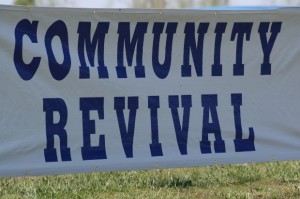 Gilbert, Arizona — A small church in Arizona has lost its federal appeal to strike down an ordinance that indirectly forces the church to display its signs announcing its Sunday services in the dark of night, while allowing other types of signs to remain displayed 24/7.
Gilbert, Arizona — A small church in Arizona has lost its federal appeal to strike down an ordinance that indirectly forces the church to display its signs announcing its Sunday services in the dark of night, while allowing other types of signs to remain displayed 24/7.
Good News Community Church is pastored by Clyde Reed and is a small congregation of under 100 members. In 2008, the church filed a lawsuit in federal district court seeking to obtain an injunction against the Gilbert sign ordinance, which prohibited it from displaying temporary directional signs on the public ways more than 12 hours before services and more than 1 hour afterward. It had gotten into disputes with the city prior to filing the suit, as officials claimed that the church was displaying too many signs and was leaving them up for too long. A directional sign is a sign with an arrow, pointing traffic to a particular event or location.
Few time limitations are placed on political signs, and none at all on ideological signs — that is, a sign with a general message regarding a particular issue or subject matter. Therefore, the church advised the court that the ordinance is unbalanced and overly-burdened its desire to advertise its services out of the Bible’s command to “make disciples of all nations.”
During the initial proceedings in 2009, the district court refused to grant the injunction, seeing no problem with the requirement. The case then escalated to the 9th Circuit Court of Appeals, which ruled that there was no constitutional infirmity with the ordinance because it is “a content-neutral regulation” and “does not impermissibly favor commercial speech over noncommercial speech.”
The court, however, sent the case back to the district court to determine whether or not the church’s equal protection claims were valid regarding the discrepancy between temporary directional signs and political and ideological signs. U.S. District Judge Susan Bolton ruled against the church a second time, granting summary judgment to the city. The case then went back to the appeals court, which stood by its previous ruling on Friday.
“Accepting our opinion in Reed as law of the case, we conclude that the sign code is constitutional because the different treatment of types of noncommercial temporary signs are not content-based as that term is defined in Reed, and the restrictions are tailored to serve significant governmental interests,” the divided 9th Circuit panel concluded.
In other words, not just directional signs involving churches were affected by the ordinance, but any type of directional sign — no matter what the event or subject matter. Therefore, the requirement was ruled to be valid.
However, Judge Paul Watford disagreed with the majority, asserting that the ordinance violated both the First and Fourteenth Amendments in that it categorized non-commercial speech by its type.
“The most glaring illustration is the ordinance’s favorable treatment of ‘political’ and ‘ideological’ signs relative to the treatment accorded the non-commercial signs plaintiffs seek to display,” Watford wrote.
“‘[P]olitical’ signs – defined as ‘[a] temporary sign which supports candidates for office or urges action on any other matter on the ballot of primary, general and special elections relating to any national, state or local election’ – may be up to 32 square feet in size and may be displayed any time prior to an election and removed within 10 days after the election,” he explained. “‘Ideological’ signs – defined as ‘a sign communicating a message or ideas for non-commercial purposes’ that is not a construction, directional, political, or garage sale sign – may be up to 20 square feet in size and are not subject to any durational limits at all.”
He noted that since church services begin at 9 a.m., and the signs may only be erected 12 hours prior to the service, the signs would have to go up at 9 p.m. and remain through the dark of night, when no one could see them. Watford found the requirement in this instance to be glaringly problematic — especially in light of the fact that political and ideological signs were not subject to similar limitations.
“To sustain the distinctions it has drawn, Gilbert must explain why (for example) a 20-square-foot sign displayed indefinitely at a particular location poses an acceptable threat to traffic safety and aesthetics if it bears an ideological message, but would pose an unacceptable threat if the sign’s message instead invited people to attend Sunday church services,” he continued. “Gilbert has not offered any such explanation, and I doubt it could come up with one if it tried.”
“To us, it’s a very simple case of content-based discrimination,” commented attorney Jeremy Tedesco, senior legal counsel for Alliance Defending Freedom (ADF), which has been representing Reed and the church. “Of course we’re disappointed the court did not see it this way.”
ADF is considering an appeal. It has 14 days to file following the decision.
Become a Christian News Network Supporter...


